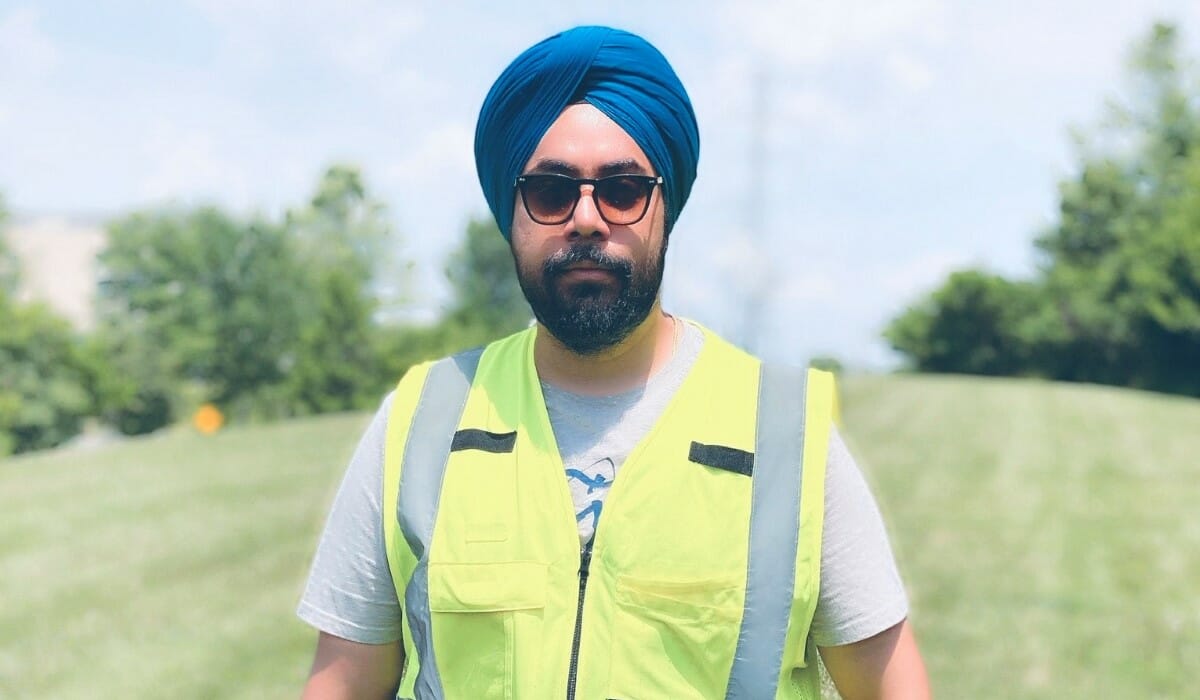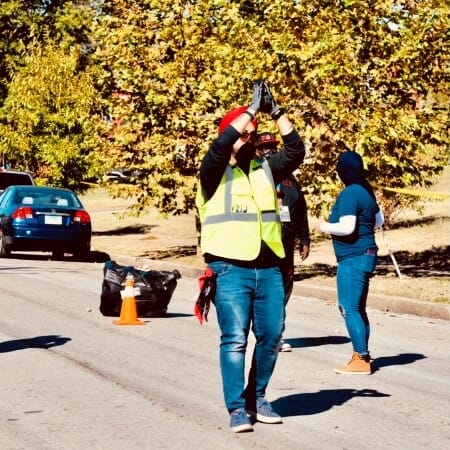Nonprofit Founder Selflessly Cares for Community during COVID-19 Pandemic

Meet Daily Point of Light Award honoree Deb Bhatia. Read his story and nominate an outstanding volunteer or family as a Daily Point of Light.
Deb Bhatia learned the value of selfless care from his parents at an early age as he grew up in India with his sister. His selflessness merged in his professional career, and now Bhatia spreads the mission through the Sikhs of STL nonprofit in St. Louis, Missouri.
He could never have predicted how much the COVID-19 pandemic would leave his community in need. But Bhatia adapted and now bridges other local St. Louis nonprofits serving under-resourced families and individuals through free meals, hygiene supplies, masks, and sanitizers. Bhatia has touched the lives of thousands of people during the pandemic, and he has no plans of stopping his selfless care for communities in need.
Describe how you first got involved with Sikhs of STL.
I’m a founder of Sikhs of STL and I founded this organization sometime in 2019 or 2018 — that was the time when I moved to St. Louis and it was a second chapter after six New York chapters of the organization.
Before the pandemic, we used to basically just do big events for Susan G. Komen Foundation and St. Jude to honor cancer survivors. We would do a turban day on a large scale where people came in and we tied their turbans to reflect our thank you for the survivors. The turban symbolizes a priceless crown, so just sharing that among the cancer survivors was our biggest motive with those organizations.
But then we opened up another chapter underneath, which was the disaster relief project and emergency response during early COVID-19. It was the first week of lockdown. When we initiated this plan, we started distributing stuff to the shelter homes because [at that time] there was a scarcity of resources — there was no help from the volunteers to cook anything for them. A lot of people were in need of food, so we ended up reaching out to a few shelters and then went out and in the streets and helped the homeless community because they had no help getting resources from anywhere. It just kept on going after that — bigger and bigger.
Can you explain how your volunteer activities have grown, especially during the pandemic?
Hygiene supplies were the greatest demand along with hot meals and then non-perishables…like canned food or ramen noodles, pasta, pasta sauce — those kinds of things. Along with that, there was a lack of education during the time when people were getting those checks from the government about the pandemic relief. If anyone was not aware how to do that, our team basically helped them out with filling in the forms and getting them the money they deserve. If any individual was looking to get benefits from any kind of government resource, we were helping them out with that. So mostly, anything and everything except handing out the cash to anyone. We were just handing out supplies.
We were serving like 150 people in one shelter in three weeks and it spread to 14 shelters where we were serving 3,000 meals in a day. Eventually, we started going into communities where the pandemic [impacted] even more financially, where people lost their jobs. So we were bringing big food drives down to those counties. We were serving like 4,000 families in a day.

What inspires you to volunteer?
I’ve been doing this for quite a long time. I’m from India and when we were kids, my parents taught us the basic principle of selfless service. They would always take us to the places where we can volunteer, so we always used to do services to the community. My parents always told me that giving back to the community is the best reward you can get.
I continued that effort. The only difference now is that I bring this into a larger scale where I could involve more families and more people. It’s also kind of, you know, bringing that education into the next generation and getting [them] involved so that they understand that giving back to the communities is a big deal. What I learned from my parents, I just keep on doing it, and then give it to the community also.
What have you learned through your experience as a volunteer?
If anyone wants to help, I would say start with one thing and in a matter of time, it will start helping out so many. Just be ready to help anyone. We’re thankful to God that we are getting so much in our life every day and if we can use a little bit to help someone in need, it would be so good. If we can be open and not judge and have no judgment between each other, that would help a lot too.
Why is it important for others to give back, especially during times of crisis?
I think it’s very important because there’s a lot of families. I met this single mother, and she hadn’t had food for two days. It was really bad for her on the third day. When we learned about her, we immediately delivered food to them. She was basically hesitant to reach out to anyone for food or help because our society has made up an aura, a space of judging someone, which makes it difficult for the people who are in need to ask for help. My intentions should be that I have to help someone and to always be ready to help someone.
Are there any partnerships, programs, or events that you are excited about?
I’m a part of the United States Air Force and I do emergency response services with them as well and I’m trying to gather more educational material for the local community where they can also get more information. I’m trying to show them how they can be safe in difficult times, and how we can provide more education for the emergency services. A lot of people are not even aware of how to get involved in emergency operations or how they can get involved in these things. But it’s very open to anyone and everyone. That’s one thing in progress.
Food drives through disaster relief are continuous and depend on who is in need. If anyone in any county is in need, they reach out and then we go ahead and do it. That happens to us quite a lot, [around] twice a month. We’re helping a few Afghan families who just recently arrived in St. Louis. We’re just being a little part of that, helping them with the resources they need.
Do you want to make a difference in your community like Deb? Find local volunteer opportunities.
